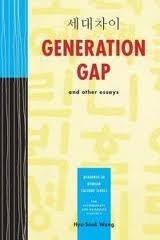
세대차이: Generation Gap and Other Essays: Readings in Korean Culture Series
Inga betyg ännu
Health & Wellness
Format
Pocketbok
Sidor
358
Språk
Koreanska
Publicerad
Aug 27, 2007
Förlag
Cheng & Tsui
Beskrivning
Hye-Sook Wang explores the intricate dynamics of generational differences within Korean society through a collection of thought-provoking essays. Each piece delves into the cultural, social, and historical contexts that shape the perceptions and experiences of varying age groups. With keen insight, Wang examines how factors such as technology, globalization, and traditional values contribute to the evolving landscape of intergenerational relationships.
The essays encourage readers to reflect on their own experiences and the broader implications of these generational gaps. Through personal anecdotes and cultural observations, Wang crafts a narrative that resonates with anyone navigating the complexities of familial and societal expectations. This collection not only serves as an essential resource for those studying Korean culture but also appeals to a broader audience intrigued by the universal theme of generational change.
Overall, Hye-Sook Wang's work is a profound exploration that invites critical thinking about the intersections of culture, identity, and the passage of time. As readers engage with her observations, they are prompted to consider how these themes play out in their own lives and communities.
The essays encourage readers to reflect on their own experiences and the broader implications of these generational gaps. Through personal anecdotes and cultural observations, Wang crafts a narrative that resonates with anyone navigating the complexities of familial and societal expectations. This collection not only serves as an essential resource for those studying Korean culture but also appeals to a broader audience intrigued by the universal theme of generational change.
Overall, Hye-Sook Wang's work is a profound exploration that invites critical thinking about the intersections of culture, identity, and the passage of time. As readers engage with her observations, they are prompted to consider how these themes play out in their own lives and communities.
Recensioner
Inga recensioner ännu
Bli den första att recensera denna bok och dela dina tankar
Lägg till första recensionenLäsdagbok
Inga läsloggar hittades
Börja spåra dina läsframsteg för att se loggar här
Lägg till din första läsloggAnteckningar
Inga anteckningar hittades
Börja skriva anteckningar för att se dem här
Lägg till din första anteckningTransaktionslogg
Inga transaktionsloggar hittades
Börja spåra dina boktransaktioner för att se loggar här
Lägg till din första transaktionslogg